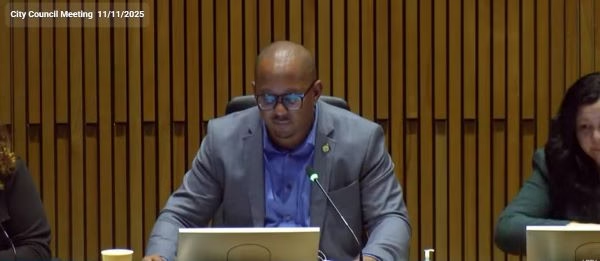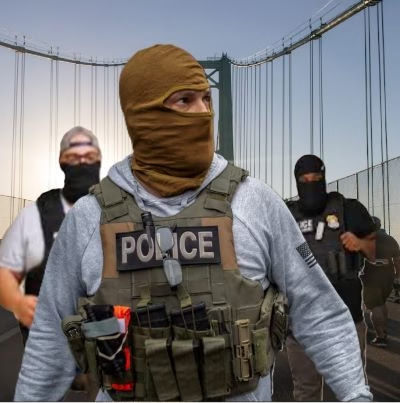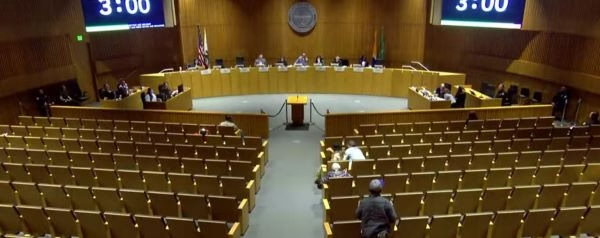
On Veterans Day, Long Beach Passes Military Equipment Order With Little Scrutiny
On Veterans’ Day, the city of Long Beach city council voted in favor of concluding the public hearing on the Long Beach Police Department’s 2024 Annual Military Equipment Use Report because no one was there to advocate for it.
Long Beach Mayor Rex Richardson asked if there was a brief report on the agenda item, to which the representative for the LBPD replied, “Only if you need one,” before the mayor called for another member of the council to second the motion to adopt the 2025 Military Equipment Special Order
The report is required by California Assembly Bill 481, a 2021 law that regulates how state and local law enforcement agencies can fund, acquire, and use certain kinds of “military equipment.”
Indeed, there was one public commenter, Kathleen Adams, who noted that the agenda item was “about the militarization of the police, apparently, but there doesn’t appear to be a report.”
Except, there was a report. The LBPD representative implied there was a report, but used the council’s malaise to allow the LBPD to get away with not reading the report into the record, let alone releasing it publicly.
The full report can be found at: https://www.longbeach.gov/police/about-the-lbpd/lbpd-ab-481
Ever since the Trump regime started deploying federal officers to round up racially profiled immigrants, documented or not, local elected officials have flirted with the idea that local law enforcement can be deployed as a kind of check on federal law enforcement officers going after the undocumented — a potentially dangerous naivety that ignores the militarization of local police departments that proactively pushes back on press freedom and protection of the press in times of protest.
During the June 2025 No Kings demonstration in downtown Los Angeles, multiple journalists were struck by non-lethal rounds in separate incidents while reporting live on immigration-raid protests—events documented by the L.A. Press Club and Status Coup that led to a federal lawsuit against the city.
Following the demonstrations, the L.A. Press Club and Status Coup filed a federal lawsuit against LAPD and the city, accusing officers of using “less-lethal munitions,” tear gas, and other tactics in violation of state law (SB 98) and First Amendment rights.
The First Amendment Coalition highlighted that reporters were “charged by horses, and forcibly prevented from filming” in their lawsuit announcement.
In July, U.S. District Judge Hernán D. Vera granted a 14-day restraining order preventing the LAPD from using non-lethal weapons (rubber bullets, chemical irritants, flash bangs) against journalists not posing a threat.
The order also bars the LAPD from removing journalists from closed protest areas, assaulting, obstructing, or arresting them simply for doing their reporting.
Despite the July court order, during a protest on Aug 8, officers used batons against a crowd that included journalists, resulting in reported bruises and injuries to photojournalists.
The plaintiffs filed a motion alleging contempt of court, asking for the injunction to explicitly forbid not just projectiles but “any other type of force.”
In September, Judge Vera extended his order to further restrict not just LAPD but also the Department of Homeland Security from using crowd-control weapons on journalists and nonviolent protestors.
The ruling criticized indiscriminate use of force, noting many journalists, observers, and peaceful protesters had been targeted.
The City of L.A. filed an appeal to the 9th Circuit Court, arguing the ban on use of less-lethal weapons is overly broad and operationally unworkable.
The L.A. City Council unanimously rebuked the City Attorney (Hydee Feldstein Soto) for seeking to lift Judge Vera’s order, calling the attempt “unacceptable” and reaffirming that force against journalists is not allowed.
Councilmember Hugo Soto-Martínez and others also pushed an ordinance to limit LAPD’s use of kinetic projectiles and chemical agents, especially against protesters and media.
The LBPD reported receiving no formal grievances or objections concerning the use of military equipment, while the LAPD reported 21 complaints, nine of which were ruled unfounded, six as demonstrably false, three found pending investigation, adjudication, or review; one ruled as having insufficient evidence to adjudicat,e and one exonerated.
Neither report reflected the No King protests that have emerged in 2025.


